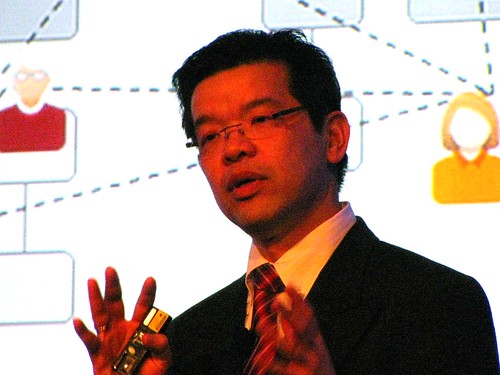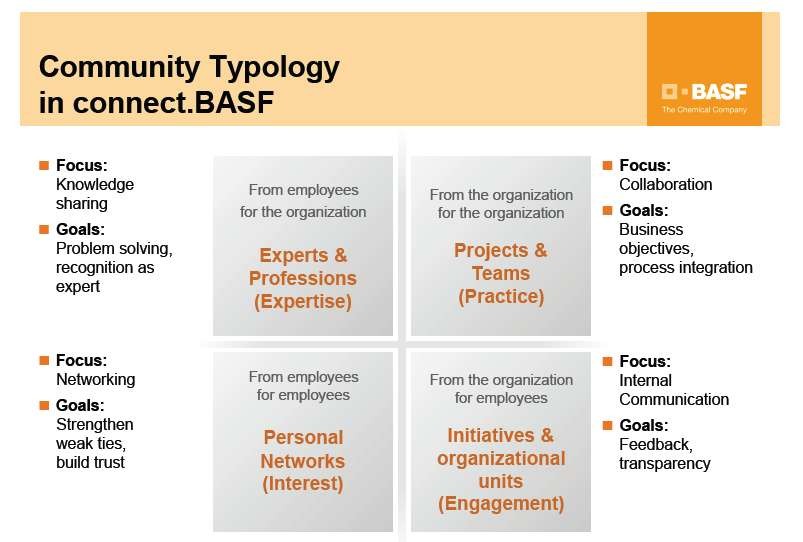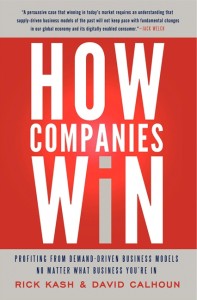 When building a collaborative workplace, a “build it and they will come” attitude is a recipe for disappointment. Effective deployment strategies demand a mix of promotion, training and tolerance of the adoption strategies that employees choose.
When building a collaborative workplace, a “build it and they will come” attitude is a recipe for disappointment. Effective deployment strategies demand a mix of promotion, training and tolerance of the adoption strategies that employees choose.
Speakers at Lotusphere today offered tips on rolling out collaboration platforms to employees who aren’t accustomed to the concept. The start with knowing what you want to accomplish.
 At BASF Chemical, a €100 billion European chemical supplier with 109,000 employees, the goals were three fold: Encourage networking, share knowledge and improve collaboration across the far-flung organization, said Dr. CheeChin Liew (right, @twiliew), Enterprise Community Manager. The company already had a mix of stand-alone blogs, forums and wikis that had sprung up to address specific problems, but there was no integration between them. BASF Chemical wanted to see two-thirds of those silos move to a shared service within a year.
At BASF Chemical, a €100 billion European chemical supplier with 109,000 employees, the goals were three fold: Encourage networking, share knowledge and improve collaboration across the far-flung organization, said Dr. CheeChin Liew (right, @twiliew), Enterprise Community Manager. The company already had a mix of stand-alone blogs, forums and wikis that had sprung up to address specific problems, but there was no integration between them. BASF Chemical wanted to see two-thirds of those silos move to a shared service within a year.
Don’t talk platforms to the users, Liew cautioned. Speak in terms that make business sense. Community managers made it a point to emphasize the value of sharing, whether through blogs, forum posts or just bookmarks. “Once people start sharing, they want to go to the next level, like file-sharing or managing a wiki. Once they connect through sharing, others will imitate them,” he said.
BASF Chemical set up webinars, learning events, demonstrations and consulting services to move people onto the new platform at their own pace. Pariticipation should be voluntary and motivated by perception of value, he said. “You want people inviting others to join the community.”
As participation grew, BASF Chemical kept the momentum growing through a demo-oriented road show, presentations by guest speakers and community exchanges. Half-day sessions built in lunch gatherings so that employees would network with each other. Informal networking is important, Liew said, and don’t start the session with lunch. Make it part of the organic learning process.
Best practices are recognized through online nomination and voting in which people recognize the accomplishments of their peers. This crowdsourcing component is an important part of nurturing the image that the network is owned by the employees and not mandate by management, Liew said.
BASF Chemical’s approach hit the mark, with participation growing from 1,000 people in the pilot phase to 28,500 after 18 months. More than one-third of new member signed up because of peer recommendations. Equally important: Most new participants moved over from existing networks, seeking to broaden their range of connections. “They joined the community to move beyond the silos,” he said.
The collaboration network now supports over 2,300 communities, which fall into four basic categories:
- Expert and professional communities are created by users to benefit the organization. They cluster around topics of professional expertise.
- Personal networks are formed by users for other users and generally relate to non-professional topics.
- Initiative and service communities are built by the organization for users and usually concern topics that the company wants to communicate to employees.
- Projects and working teams are formed by the organization for the organization and typically have a project management component

Community organizers are allowed to set their own access controls. More than half of the communities restrict membership in some way, about 15% are completely open and 30% are moderated. Don’t set rules about how open a community should be, Liew cautioned. People will choose the path that works for them. Organizations should also be prepared for a certain amount of non-work-related conversation. That’s perfectly all right if it attracts others to come on board.
Finally, it’s important to be sure you have the means to highlight success stories. Liew told of one product manager who spotted a post on the company’s Facebook page that he couldn’t decipher: “Holi hay ghar me mat bhetto.”
Google Translate couldn’t figure it out, so the product manager put the question on the network. Within 13 minutes he learned from another employee that the request was in Hindi and related to colors for a festival in India. The manager uploaded a video of BASF pigments and quickly got 35 likes and four positive comments. It was a small victory, but one that demonstrated the power of community intelligence.
| This is one in a series of posts sponsored by IBM Midsize Business that explore people and technologies that enable midsize companies to innovate. In some cases, the topics are requested by IBM; however, the words and opinions are entirely my own. |










